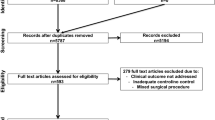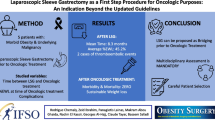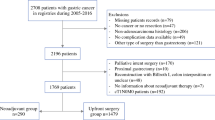Abstract
Purpose
This study aimed to analyze postoperative and 90-day morbidity and mortality and their risk factors in all digestive cancer curative intent resections of a single digestive surgical department in a low-mid income country.
Methods
All consecutive patients who underwent a surgical resection for digestive cancer with a curative intent between January 1, 2021, and December 31, 2021, were included. This is a retrospective analysis of a prospective cancer surgery database managed during the period. Patterns and factors associated with increased morbidity and mortality were analyzed and presented in tabular and descriptive forms.
Results
Seventy-six patients were included, 38 (50%) were men with a mean age of 59 years (±13.5). Forty patients (52.63%) had tumors locally advanced, staged CT3–CT4 on preoperative imagery. Thirty-three of our population (43.42%) had laparoscopic surgery (conversion rate at 12.12%). In immediate preoperative, the morbidity rate was 36.84%; among each, 7 patients (9.21%) had serious complications (>2 Clavien-Dindo grade), and mortality rate was 5.26%. At 90 days after surgery, morbidity remained the same, and mortality increased to 7.9%. Risk factors for increased morbidity and mortality were female gender, obesity, high levels of carcinoembryonic antigen, hypoalbuminemia, laparotomy approach, hand sewn anastomosis, prolonged operating time, and wide drainage (p < 0.05).
Conclusions
This study provides figures on mortality and morbidity related to digestive cancer curative surgery in a low-mid income country digestive department and discusses risk factors increasing postoperative complications and death.


Similar content being viewed by others
Data availability
The data that support the findings of this article are available from the corresponding author upon reasonable request.
References
GlobalSurg Collaborative and National Institute for Health Research Global Health Research Unit on Global Surgery. Global variation in postoperative mortality and complications after cancer surgery: a multicentre, prospective cohort study in 82 countries. Lancet. 2021 397(10272):387-397. https://doi.org/10.1016/S0140-6736(21)00001-5. Epub 2021 Jan 21. Erratum in: Lancet. 2021 Mar 6;397(10277):880
Basavaiah G et al (2018) Financial impact of complex cancer surgery in India: a study of pancreatic cancer. J Glob Oncol 4:1–9
Le Manach Y et al (2016) Preoperative score to predict postoperative mortality (POSPOM): derivation and validation. Anesthesiology 124:570–579
Manekk RS, Gharde P, Gattani R, Lamture Y (2022) Surgical complications and its grading: a literature review. Cureus 14:e24963
Ogbuanya AU-O, Enemuo VC, Eni UE, Nwigwe CG, Otu O (2022) Mortality audit in general surgery unit and lessons learned at a Nigerian tertiary hospital: a single centre observational study. Pan Afr Med J 41:228
Meguid RA, Bronsert MR, Juarez-Colunga E, Hammermeister KE, Henderson WG (2016) Surgical risk preoperative assessment system (SURPAS): III. Accurate preoperative prediction of 8 adverse outcomes using 8 predictor variables. Ann Surg 264:23–31
Wagner M et al (2004) Curative resection is the single most important factor determining outcome in patients with pancreatic adenocarcinoma. Br J Surg 91:586–594
Dindo D, Demartines N, Clavien P-A (2004) Classification of surgical complications: a new proposal with evaluation in a cohort of 6336 patients and results of a survey. Ann Surg 240:205–213
Wirth K, Näpflin M, Graber SM, Blozik E (2022) Does hospital volume affect outcomes after abdominal cancer surgery: an analysis of Swiss health insurance claims data. BMC Health Serv Res 22:262
Li J (2022) Digestive cancer incidence and mortality among young adults worldwide in 2020: a population-based study. World J Gastrointest Oncol 14:278–294
Ding L et al (2021) Effects of preoperative frailty on outcomes following surgery among patients with digestive system tumors: a systematic review and meta-analysis. Eur J Surg Oncol 47:3040–3048
Wiseman JT et al (2022) Patient perspectives on defining textbook outcomes following major abdominal surgery. J Gastrointest Surg 26:197–205
Collaborative ES (2020) Safety of hospital discharge before return of bowel function after elective colorectal surgery. Br J Surg 107(5):552–559. https://doi.org/10.1002/bjs.11422
Peltrini R, Imperatore N, Carannante F et al (2021) Age and comorbidities do not affect short-term outcomes after laparoscopic rectal cancer resection in elderly patients. A multi-institutional cohort study in 287 patients. Updat Surg 73:527–537. https://doi.org/10.1007/s13304-021-00990-z
Paredes-Torres OR et al (2022) Risk factors associated with postoperative morbidity and mortality in D2 radical gastrectomy for gastric cancer. Rev Gastroenterol Mex 87:149–158
El Amrani M et al (2019) Specificity of procedure volume and its association with postoperative mortality in digestive cancer surgery: a nationwide study of 225,752 patients. Ann Surg 270:775–782
Uttinger KL et al (2022) Mortality, complications and failure to rescue after surgery for esophageal, gastric, pancreatic and liver cancer patients based on minimum caseloads set by the German Cancer Society. Eur J Surg Oncol 48:924–932
Mintziras I et al (2021) Postoperative morbidity following pancreatic cancer surgery is significantly associated with worse overall patient survival; systematic review and meta-analysis. Surg Oncol 38:101573
Hall C et al (2019) A review of the role of carcinoembryonic antigen in clinical practice. Ann Coloproctol 35:294–305
Zhang Y, Tan S, Wang J, Zhang Z, Wu G (2021) Nutrition and exercise prehabilitation in elderly patients undergoing cancer surgery. Asia Pac J Clin Nutr 30:349–357
Li Y, Deng JJ, Jiang J (2023) Relationship between body mass index and short-term postoperative prognosis in patients undergoing colorectal cancer surgery. World J Clin Cases 11(12):2766–2779. https://doi.org/10.12998/wjcc.v11.i12.2766
Tsekrekos A, Lovece A, Chrysikos D, Ndegwa N, Schizas D, Kumagai K (2022) Ioannis Rouvelas, Impact of obesity on the outcomes after gastrectomy for gastric cancer: a meta-analysis. Asian J Surg 45(1):15–26
Mengardo V, Pucetti F, Mc Cormack O, Chaudry A, Allum WH (2018) The impact of obesity on esophagectomy: a meta-analysis. Dis Esophagus 31(6) https://doi.org/10.1093/dote/dox149
Carvalho RLR, Campos CC, Franco LMC, Rocha ADM, Ercole FF (2017) Incidence and risk factors for surgical site infection in general surgeries. Rev Lat Am Enfermagem 25:e2848
Cheng H et al (2017) Prolonged operative duration increases risk of surgical site infections: a systematic review. Surg Infect 18:722–735
Cheng H et al (2018) Prolonged operative duration is associated with complications: a systematic review and meta-analysis. J Surg Res 229:134–144
Zhang W et al (2018) Prophylactic abdominal drainage for pancreatic surgery. Cochrane Database Syst Rev 6:CD010583
Podda M et al (2020) Prophylactic intra-abdominal drainage following colorectal anastomoses. A systematic review and meta-analysis of randomized controlled trials. Am J Surg 219:164–174
Wang Z, Chen J, Su K, Dong Z (2015) Abdominal drainage versus no drainage post-gastrectomy for gastric cancer. Cochrane Database Syst Rev 2015(5):CD008788. https://doi.org/10.1002/14651858.CD008788.pub3
Dezfouli SA et al (2021) Systematic review and meta-analysis of the efficacy of prophylactic abdominal drainage in major liver resections. Sci Rep 11:3095
Ye S-P, Qiu H, Liao S-J, Ai J-H, Shi J (2019) Mini-invasive open resection of colorectal cancer and liver metastases: a meta-analysis. World J Gastroenterol 25:2819–2832
Chan BYO, Yau KKW, Chan CKO (2019) Totally laparoscopic versus open gastrectomy for advanced gastric cancer: a matched retrospective cohort study. Hong Kong Med J 25:30–37
Acknowledgements
None.
Funding
The authors have no source of funding or financial support except themselves.
Author information
Authors and Affiliations
Contributions
All authors contributed to the study conception and design. F. S. designed the study; S. E. F. and M. O. performed the statistical analysis. H. S., Z. L., and H. A. collected the data; H. S. and N. J. wrote the first draft of the manuscript. J. E. H. participated in the study design and critically reviewed the manuscript. B. Y., R. M., M. M. A., A. H. and F. S. critically reviewed the manuscript. All authors read and approved the final version of the manuscript.
Corresponding author
Ethics declarations
Ethical approval and consent
The study was approved by the Ethics committee of the Mohammed V University in Rabat
Consent for publication
All patients consented to use their data for scientific study and publication purposes.
Competing interests
The authors declare no competing interests.
Additional information
Publisher’s Note
Springer Nature remains neutral with regard to jurisdictional claims in published maps and institutional affiliations.
Rights and permissions
Springer Nature or its licensor (e.g. a society or other partner) holds exclusive rights to this article under a publishing agreement with the author(s) or other rightsholder(s); author self-archiving of the accepted manuscript version of this article is solely governed by the terms of such publishing agreement and applicable law.
About this article
Cite this article
Sekkat, H., Agouzoul, H., Loudyi, Z. et al. Digestive cancer surgery in low-mid income countries: analysis of postoperative mortality and complications in a single-center study. Langenbecks Arch Surg 408, 414 (2023). https://doi.org/10.1007/s00423-023-03156-0
Received:
Accepted:
Published:
DOI: https://doi.org/10.1007/s00423-023-03156-0




